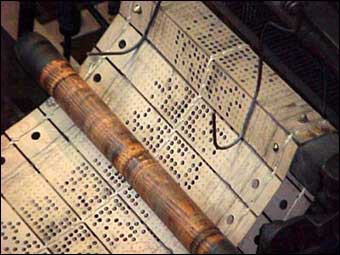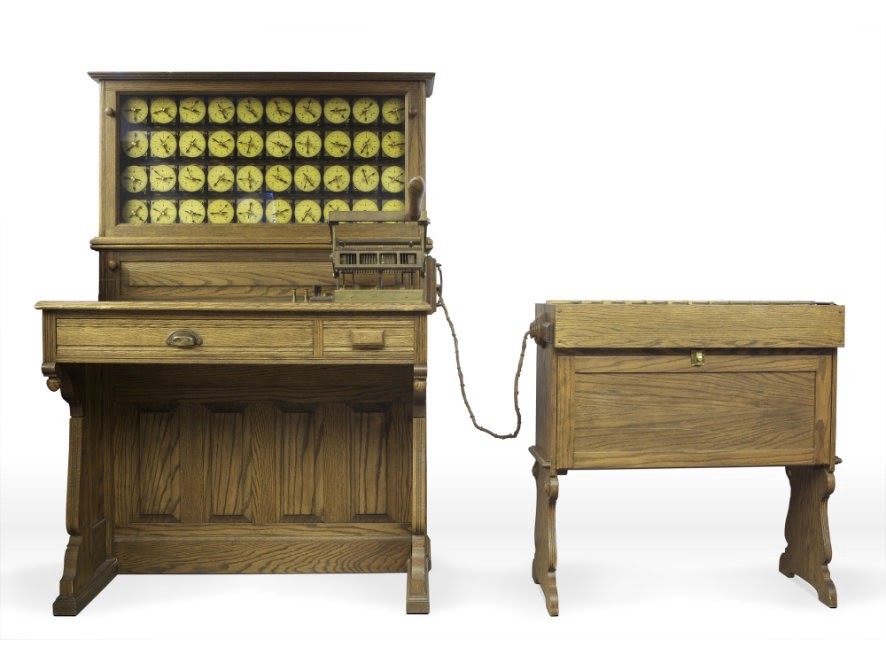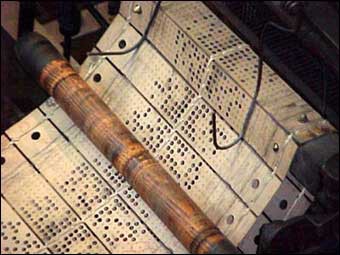Happy Birthday Digital! – FREE UK Press Release Distribution
(and ‘Thanks JMJ’….)
It’s April 15th. Today, the technology behind the Internet is 215 years old and there’s someone, in particular, we should remember. Doing this will also remind us of the public functions of information handling, accounting and mass media communications.
Today, we’re saying ‘happy birthday’ to an inventor who was instrumental in developing all 3 as automated technologies. In this way, they’re all 215 years old this April 15th, thanks to one man — oh, and they all started out as public goods!
How things have changed…
In 1801, Joseph Marie Jacquard (JMJ), through his invention of a punched card ‘interface’ turned hand drawn artwork and designs into code, enabling skilled workers to ‘programme’ a loom to reproduce them in woven cloth. For the first time, detailed designs and artwork became available to a mass market . The machine that followed, the ‘Jacquard Loom’, was made public property in 1805 and JMJ was given a lifelong pension from the city of Lyon. Essentially, the binary code he invented was made available to all — from the very beginning. So today’s a good day to remember the gift and its inventor.


Jacquard’s method of using punched cards was used throughout the nineteenth century and was adopted by Charles Babbage for his ‘Difference Engine’ — which famously led to the modern ‘mainframe’ by creating the ‘on/off’ language of digital communications. It was also adopted by the ‘father of data’, Herman Hollerith, whose punched card system, (US Patent 395,782 ‘The Art of Compiling Statistics’, applied for Sept 23rd 1884) led to the beginning of automated accounting with his ubiquitous Electric Accounting ‘Tabulating’ Machines, (EAM). Hollerith would become a seminal figure in data and accounting and in 1911 formed the company which would later become IBM in 1924. Anyone working in computing before 1980 would still be using a ‘fortran’ punched hole system on Hollerith cards derived from JMJ’s 1801 public invention. (See here and here for more detailed histories)


A replica of the Hollerith tabulating desk: Image courtesy Computer History Museum
The Jacquard method, invented in 1801, was still in daily use as late as 1980!
So, happy birthday Monsieur Jacquard and your ‘loom interface’.
And….?
Well, as we acknowledge this heritage of mass media communications, data processing, and accounting, we might also remember that all things have an ancestry and derive their value from some common source, material or immaterial. In 1805, this culminated knowledge was made public, but in 2020, we are in the midst of a global pandemic crisis, which private ownership, the world’s default ‘operating system’, is part-responsible for causing; incapable of preventing and struggling, despite its vast monetary wealth, to solve.
Today’s ‘dot-coms’, whilst using public data and ‘user generated content’ to produce before tax profits, are commonly failing to contribute to public causes including this latest public health crisis. So whilst we can create vast sums of monetary wealth quickly, it has come at the cost of democratic, reliable systems to manage and purpose that wealth for the general public. This leads to the waste and profligacy we are fast deciding we can ill afford. A lot of people are beginning to realise we need to do more than just create profit — as profit has no answers or solutions on its own. We need to produce shared wealth, knowledge, and rights too — and we want you to join us.
CultureBanked wants to reverse these trends and re-build the public element of these technologies. For example, there are 3 styles of ‘open value’ accounting we can use, by collecting data in specific ways, to re-common elements of the Internet, data-processing and, particularly, tax and contributions accounting. But we’ll get to those another time. For now, let’s just stick to: ‘Happy Birthday’!
So maybe today is a good day to remember this shared heritage and to start to reconsider how its various elements can contribute to common wealth and common causes such as public health, in a way that puts those responsible for it (which we are fast learning is all of us) back in the driving seat of making decisions and planning. If one thing is very clear from this crisis, we are all safer when managing our public health and our rights and responsibilities around it — together and in common.
Thanks JMJ — soon to be appreciated!
Liam Murphy
— — — — — — — — — — — — — — —
(Notes to editors — and suggested hashtags):
This is one in a series of articles making a case for Community Rights Management — a campaign for part public ownership — by equity and under license — of cultural assets across digital platforms. In the Covid-19 crisis, we have seen large social media and other digital platforms increasing market share, whilst benefiting from overwhelming and unfettered use of public value via data and ‘user-generated content’. CultureBanked is both a service and a campaign to harness this public value and repurpose it back into public causes… under public ownership and control!
#culturebanked #happybirthday #interoperability #digitaltaxes #localtaxes #taxunderlicense #digitaldemocracy #communitywealth #communityrightsmanagement #salestaxes #taxonproduction #notaxonprofit #digitalgeorgism #sharingeconomy #circulareconomy #rightscompliance #Jacquard #textiles #accounting #socialaccounting #thermodynamicaccounting #contributoryaccounting #REAaccounting #publicgoods #kendraio #liammurphy #marianamazzucato #kateraworth #michelbauwens #silkehelfrich #davidbollier #guystanding #commons #commonstransition #georgemonbiot #greennewdeal #covid19 #localdemocracy #localauthorities #openvalue #openvaluenetworks #sensorica #p2pfoundation

